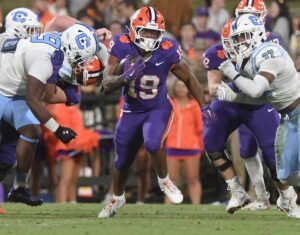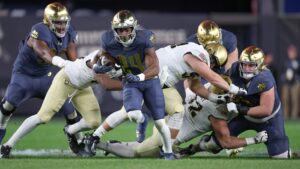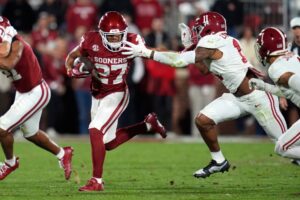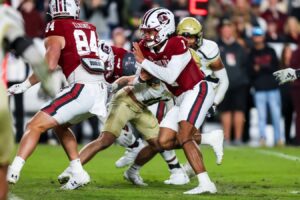To some UCLA devotees, the names rattle off the tongue with great ease. The history of Bruins who made social change is always easy to find on campus. Jackie Robinson, Kenny Washington, (the Jackie Robinson of the NFL), and Arthur Ashe are just a few that jump to the front of mind. But what does that mean now, in a period of large-scale social activism? Are the names of the past relevant to the causes of the present and future? Is student activism on college campuses going to make a large scale return? Or will the COVID-19 virus and reduced on-campus presence this Fall squelch a movement? There is someone who still believes UCLA is “barrier breakers.”
New UCLA athletic director Martin Jarmond has already had a full plate. And he is still easing his way into the job. He took the job, moving on from the same position at Boston College, with the UCLA campus and LA site unseen thanks to the shutdown caused by the virus. He has yet to even find a new house for his family. Now, as he gets ready to establish himself in his new office, there is daily news of social unrest and protests in the streets. What is a new leader of a college athletic department to do or say? Especially one who, at the age of 40, is not that far removed from his own college days.
UCLA Is Barrier Breakers
In an exclusive interview with Last Word on College Football, Jarmond said college is a critical time for social awareness. “You’re at college. And you’re doing something that you love. You’re influenced and you have influence by many different factors. You can’t ignore what is going on around you. And you’re very passionate about it.”
Jarmond said college is the first real place where you are challenged to think critically. The end result is more social activism on any range of the political spectrum. “This is a critical point in our country, but it is also a critical time for our student athletes and our young people as they process and determine how these things impact them.”

The whole college athletics community saw what happened in Stillwater, Oklahoma over the last week. Social media sites had pictures of football coach Mike Gundy donning a t-shirt from a fringe TV network that has been harsh on the Black Lives Matter movement. Gundy has been on the record about the network and his beliefs in the past. His star running back, Chuba Hubbard, felt slighted by his coach’s photos and promotion of the network. He, along with several teammates, threatened to shut down their off-season workouts until conversations were had and issues were resolved. The two reached a temporary détente this week. Gundy issued a highly choreographed statement disavowing any of his past beliefs on the issue.
Does that mean the college athletes of today, with social media accounts at their instant disposal have more power than past generations? Jarmond resisted the word “power,” instead preferring to allocate “influence” to the new generation. “They have more platforms and channels to express their opinions and thoughts. You hope that they use that as an ability to share their message and how they feel in a way that can bring change or positivity. I don’t think a social media platform gives someone power. I do think social media does have influence.”
Jarmond is part of new ilk of athletic directors. His playing days are not that far behind him (a guard on the UNC Wilmington basketball team from 1997-2001). He has said in the past that he hopes to be able to have close communication relationships with the student-athletes at UCLA. And, not insignificantly, he is one of a very small handful of black athletic directors at the FBS level of college sports. Growing up in the relatively small town of Fayetteville, North Carolina gave him experiences that are not dissimilar from some of what the current protests are about. In the current day, Fayetteville is 40% black population. It has two four-year universities, including an HBCU (Fayetteville State).
But in Jarmond’s youth, that was not the case. He took an audibly deep breath when asked if he had any unfortunate encounters with law enforcement. “I have. But my experience hasn’t been necessarily much different from some other black men that have had experiences. The thing that I think that is important is to be able to talk about those, to share and listen. And hopefully we get to a place where we can impact, and effect change in a positive way in our communities. It is going to take all of us to do that. There has to be a shared sense of obligation and duty to make it better.”
In the midst of the tumult, the UCLA athletic department introduced the “Voting Matters Initiative,” (VMI). The school is partnering with various on and off-campus organizations to get the student-athletes aware and involved not only in voter registration efforts, but educating them on all candidates and their platforms at a local and regional level, not just the presidency. All the coaches in every sport are compelled to provide time during their schedules for voter education, registration, and information.
Jarmond said it comes out of an understanding that talking is not enough. Action must come with it. “I think that’s very important to show our student-athletes and show our community that it can’t just be something we discuss. We have to have tangible action items that we do to show that we want to make change.”

Many UCLA athletes, past and present, have taken part in the protests and marches either in their current city or back home in Los Angeles. “I think it’s important for young people to be inspired and moved, if they feel that is important to them, to participate. Peaceful protests are important, and I encourage involvement if that is something our young people want to do.”
Different schools across the country are lending to themselves to a new social activism from their student-athletes in different ways. Clemson held a rally last weekend that was led by the football team. Protesters in State College, PA have been marching for weeks, demanding police reforms. They have been joined by members of the Penn State football team. Other schools have wished for and gotten more subdued responses from their student body, often commensurate with their location in the country, or the vibe of their local communities.
But aren’t things supposed to be different at UCLA? This is, afterall, Los Angeles….and this is UCLA. At the height of his college basketball prowess, Bill Walton was leading anti-Vietnam War protests. Kareem Abdul-Jabbar, then Lew Alcindor, became an active participant in the civil rights movement. And they fed off the legacies of Robinson, and Washington, and Ashe.

“UCLA is barrier breakers,” Jarmond said. “UCLA is leaders, and UCLA is elite. It is important with our history and our tradition of affecting change and impacting our local communities, not just in sport, but in life, and changing the world, absolutely there is a responsibility at UCLA for our student-athletes, and our students, to be leaders. It’s our job to foster that environment and encourage our young people to be heard and to be leaders. Anything else, I think it would be a disservice to all the past student athletes and Bruins who have come before us. Absolutely, it is different at UCLA, and UCLA is different. We are leaders, and that is my expectation for it to continue.”






